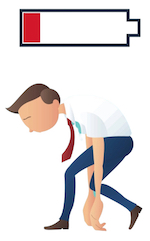
One may identify as a “workaholic” when they engage in excessive work, while another may experience “burnout” due to the accumulation of stress and fatigue. Until now, there was no term to describe the need to achieve perfection at work, driven by ambition, self-demand, and perfection.
The name: “Sisyphemia”, a word created by the French philosopher Albert Camus for describing the human condition of having to perform repetitive and meaningless tasks.
The word too refers to the myth of Sisyphus, a character from Greek mythology whom the gods condemned to carry out an absurd and endless task. Sisyphus was condemned to push a large stone uphill, but every time he was about to reach the top, the stone would fall, and he would have to start all over again.

“Sisyphemia” describes an activity or effort that seems endless and futile. Despite continuous attempts, a definite or satisfactory result is never obtained. “Sisyphemia at work” is feeling trapped in a monotonous and repetitive work routine, like the punishment of Sisyphus in the Greek myth. A feeling that leads to frustration, demotivation, and chronic stress that leads to illness, including mental illness.
Symptoms of sisyphemia. Physical and emotional effects of not meeting your professional goals. The feeling of imperfection, even when you have done your best. Obsession with to-dos and constant thoughts about how to resolve them. Poor ability to control stress or enjoy rest. Anxiety, anguish, and depression. Physical aches and pains such as headaches, stomach aches, etc. Insomnia and difficulty resting. The constant need for approval and recognition at work. Low self-esteem and doubts about identity without work.
Fatigue is one of the most common symptoms of sisyphemia, caused by the obsession to work to the limit and over the hours needed to achieve perfection. Stress and mood swings are some of the emotions that may be affected. In addition, difficulties in performing daily tasks, sleeping problems, and a weakened immune system may occur.
The consequences can have a prolonged impact and impact both psychologically and physically in various ways. For example, they can result in an increasingly severe deterioration of health due to a weakened immune system. Lack of motivation and loss of interest in work can psychologically impact the individual, which could lead to the end of their career.
Individuals diagnosed with sisyphemia cannot disconnect from work during their days of rest or when they lie in bed. Their minds become automatic, and they often think about tasks that need to be done, how they feel about themselves, and what they need to do at work. This results in prolonged work hours, inadequate sleep, reduced leisure time, and social isolation in favor of work. Self-demand and perfectionism drive them to take more stimulants like caffeine or anxiolytic to meet self-imposed standards.






